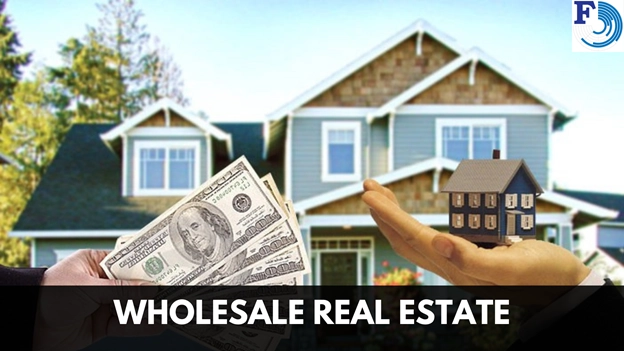wholesale real estate

Understanding Wholesale Real Estate: A Profitable Investment Strategy
Wholesale real estate is one strategy that has gained significant popularity in the investment circles among real estate investors. The method is seen to make one’s profits without the necessity to buy, hold, or renovate properties. Wholesale real estate investors work as middlemen, purchasing the property at a deeply discounted price and then selling it to another investor or buyer at a markup.
Wholesale real estate could be the perfect entry point if you are looking into venturing into real estate investing. The following article explains what wholesale real estate is, how it works, and how to get started into this profitable niche.
What Is Wholesale Real Estate?
Wholesale real estate is defined as the business of locating egregiously discounted properties; in many cases these are distressed or in need of repair and usually getting under contract to purchase. Once that property is under contract, the wholesaler can then sell or assign the contract to another buyer or investor at a higher price. The difference between that original contract price and what that buyer agrees to pay is the wholesaler’s profit.
The key here is that wholesalers typically never take ownership of the property themselves. Instead, they leverage their ability to find good deals, negotiate with sellers, and market properties to potential buyers. This allows them to generate profits without the risks or responsibilities that come with ownership, renovation, or management.
How Does Wholesale Real Estate Work?
The process of wholesale real estate can be broken down into a few simple steps:
Find distressed properties: The wholesaler usually targets distressed or undervalued properties that require repair, have motivated sellers, or are in foreclosure. Generally, such properties are sold at a steep discount, which offers investors a good option to buy low.
Negotiate a Contract: Once a property is identified, the wholesaler negotiates with the seller and agrees to purchase the property for a low price. Then, the wholesaler signs a purchase contract, which includes an assignment clause, whereby the contract can be sold to another buyer.
Find a Buyer: The wholesaler’s duty is to market the property to other investors, rehabbers, or homebuyers seeking a deal. Once the buyer has been located, the wholesaler assigns or sells the purchase contract to the buyer at a higher price.
Earn Profit: The wholesaler earns his or her profit from the difference of the contract price and that which the buyer is willing to pay. The profit varies anywhere from a few thousand to tens of thousands of dollars, depending on the deal.
Key Benefits of Wholesale Real Estate
Wholesale real estate holds several benefits for seasoned investors and newbies alike.
Low Capital Investment: One of the major attractions of wholesaling real estate is the minor capital commitment required. There is no need for large quantities of money to purchase properties in wholesaling because they do not purchase the property. They buy the contract that can be sold to buyers. This makes it accessible to people with limited capital to invest directly.
Quick Profits: Wholesale real estate deals close in as short as weeks, much quicker than any other form of real estate investing. These wholesalers can earn their profits quickly and roll these profits back into a future deal.
Low Risk: Wholesalers never take ownership of the property. This places them in a much lesser financial risk than other real estate investors. They are not held responsible for repair, management, and maintenance costs that can significantly affect profit levels.
Flexibility: Wholesale real estate is flexible and does not require long-term commitments. Wholesalers can choose to work on deals part-time or full-time, depending on their goals. This makes it a great side hustle for those looking to get started in real estate investing.
Networked Interrelationship Wholesaler wholesalers often deal with a relationship network of other investors and rehabbers and realtors or agents. This network and communication could open doors to so many more opportunities and possibilities in the industry.
Dissadvantages of wholesale real estate
Wholesale real estate doesn’t come without its negative sides. Here are just a few of the potential barriers wholesalers may face:
Finding The Right Properties: It is time consuming and challenging to find properties that are significantly discounted. Wholesalers require being good at analyzing the property, identifying the right conditions in the market, and finding motivated sellers.
Competition from Other Wholesalers: In competitive markets, it is possible that different investors or wholesalers will try to purchase the same property. This will inflate the price of the property and make it more challenging to find deals with significant profit potential.
Legal and Ethical Issues: Wholesale real estate is accompanied by certain legal considerations. One has to understand contract law, assignment clauses, and disclosure requirements. Wholesalers must be diligent and ensure that they follow all applicable laws to avoid legal complications.
Building a buyer’s list is one of the essential components of success in wholesale real estate. A solid list of ready and willing buyers to purchase properties is crucial. It takes time and effort to build and maintain such a list, especially for beginners.
Fluctuating Market Conditions: The property market is volatile, and the profitability of wholesale deals is based on the changing economic indicators, interest rates, and current trends of the housing market. The wholesalers should follow the current scenario and get ready for a change accordingly.
How to Start in Wholesale Real Estate
If you like to begin your career with wholesale real estate, let’s get into action. The following steps would be more than helpful in that case.
Educate Yourself: Learn as much as possible about the real estate market, wholesale strategies, and the regulations in your localities. Attend workshops, read books, and listen to podcasts to learn from those experienced wholesalers.
Build a Network: Connect with other real estate professionals, investors, contractors, and other wholesalers by starting to network. Join real estate investment groups in your locality or online communities to help connect you with potential deals.
Find Motivated Sellers: You may find distressed properties through direct mail campaigns, driving for dollars, or online advertising. It’s important that you establish a lead generating system in the long term.
Negotiate and Contract: After you’ve located an opportunity, you will meet with the seller to try to negotiate the best contract possible. Ensure the contract will include an assignment clause for the purpose of selling or assignment to a buyer.
Market to Buyers: Develop a buyers list and market the deal to investors or rehabbers who may be interested. Use platforms like real estate investment groups, social media, and email lists to spread the word.
Close the Deal: Once you’ve found a buyer, assign the contract and close the deal. Make sure all paperwork is completed correctly and that both parties understand the terms of the contract.
Conclusion
Wholesale real estate can be a profitable venture if someone is willing to put in the time and legwork to locate and work through deals. It’s that simple: middlemen play between sellers and buyers in a way to earn major profits without owning the house. That is to say, with minimal capital investments, really quick turnaround time, and low-risk investments, wholesale real estate remains an attractive option for both seasoned investors as well as newcomers who would like to enter the real estate market.





